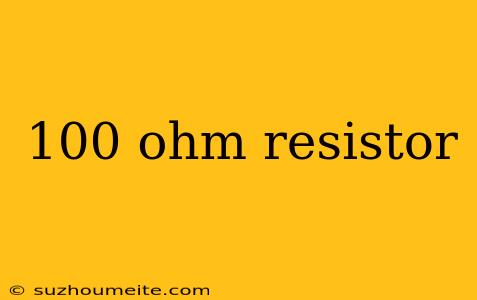100 Ohm Resistor: Characteristics, Uses, and Applications
Introduction
A 100 ohm resistor is a type of electronic component that plays a crucial role in various electronic circuits. It is a passive component that opposes the flow of electric current and is used to regulate voltage, current, and signal levels in a circuit.
Characteristics
A 100 ohm resistor has the following characteristics:
Resistance
The most important characteristic of a 100 ohm resistor is its resistance value, which is 100 ohms. This value indicates the amount of opposition the resistor provides to the flow of electric current.
Power Rating
The power rating of a 100 ohm resistor determines the maximum amount of power it can handle without overheating or damaging the component. Common power ratings for 100 ohm resistors include 1/4 watt, 1/2 watt, and 1 watt.
Tolerance
The tolerance of a 100 ohm resistor indicates the percentage of variation in its resistance value from the nominal value. For example, a 100 ohm resistor with a 5% tolerance can have a resistance value between 95 ohms and 105 ohms.
Temperature Coefficient
The temperature coefficient of a 100 ohm resistor indicates how much its resistance value changes with temperature. A low temperature coefficient indicates that the resistor's resistance value remains stable over a wide range of temperatures.
Uses and Applications
100 ohm resistors have a wide range of uses and applications in various electronic circuits, including:
Voltage Dividers
100 ohm resistors are often used in voltage dividers to regulate voltage levels in a circuit. By combining a 100 ohm resistor with another resistor of a known value, a voltage divider can be created to produce a specific voltage output.
Current Limiting
100 ohm resistors can be used to limit the amount of current flowing through a circuit. This is particularly useful in applications where excessive current can damage components or cause overheating.
Signal Attenuation
100 ohm resistors can be used to attenuate signals in audio and radio frequency (RF) circuits. By reducing the signal amplitude, 100 ohm resistors can help to prevent signal distortion and improve overall system performance.
Impedance Matching
100 ohm resistors can be used to match the impedance of different components in a circuit, ensuring maximum power transfer and efficient energy transmission.
Conclusion
In conclusion, 100 ohm resistors are an essential component in various electronic circuits, offering a range of benefits and applications. By understanding their characteristics, uses, and applications, designers and engineers can create more efficient and effective electronic systems.
